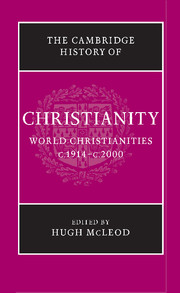Book contents
- Frontmatter
- 1 Introduction
- 2 Being a Christian in the early twentieth century
- PART I INSTITUTIONS AND MOVEMENTS
- PART II NARRATIVES OF CHANGE
- PART III SOCIAL AND CULTURAL IMPACT
- 26 Liturgy
- 27 The ‘other’
- 28 Wealth and poverty
- 29 Male and female
- 30 Christianity and the sciences
- 31 Literature and the arts
- 32 Role models
- 33 Being a Christian at the end of the twentieth century
- Bibliography
- Index
- References
33 - Being a Christian at the end of the twentieth century
from PART III - SOCIAL AND CULTURAL IMPACT
Published online by Cambridge University Press: 28 March 2008
- Frontmatter
- 1 Introduction
- 2 Being a Christian in the early twentieth century
- PART I INSTITUTIONS AND MOVEMENTS
- PART II NARRATIVES OF CHANGE
- PART III SOCIAL AND CULTURAL IMPACT
- 26 Liturgy
- 27 The ‘other’
- 28 Wealth and poverty
- 29 Male and female
- 30 Christianity and the sciences
- 31 Literature and the arts
- 32 Role models
- 33 Being a Christian at the end of the twentieth century
- Bibliography
- Index
- References
Summary
When being a Christian was dangerous
There are many parts of the world where it was dangerous to be a Christian in the twentieth century. The Bolshevik revolution of 1917 in Russia marks the beginning of a period in which numerous governments conducted sustained attacks against religion in general, against Christianity, or against particular forms of Christianity. According to Chandler and Harvey, more Christians suffered martyrdom in the twentieth century than in any other. These attacks took their most extreme forms during such periods as Stalin’s Terror in the 1930s or the Cultural revolution of 1966–76 in China, when religion was one of many forms of ‘counter-revolutionary’ activity to face systematic attack, or in Hoxha’s Albania, which in 1967 declared itself the world’s first ‘atheist state’. Most communist-ruled states have persecuted Christianity systematically, but with fewer extremes of violence. More typical than the killings or imprisonment suffered by the few have been the more mundane forms of exclusion suffered by the majority of Christians living under a hostile state: discrimination in education or the job market, the lack of churches or clergy, ridicule by those in authority, and the systematic use of schools and media to discredit their beliefs.
- Type
- Chapter
- Information
- The Cambridge History of Christianity , pp. 636 - 647Publisher: Cambridge University PressPrint publication year: 2006



